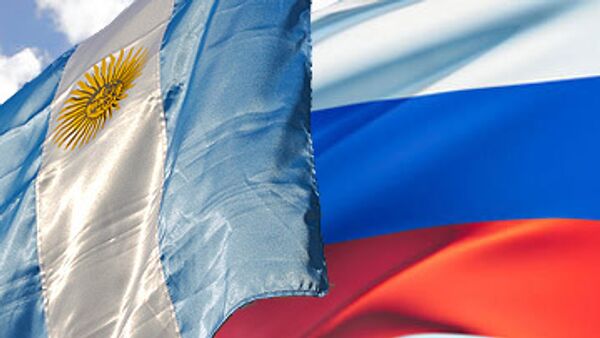On April 14, Russian President Dmitry Medvedev is to pay an official visit to Argentina, the first Russian official visit since bilateral diplomatic relations were established 125 years ago, that is, in October 1885.
Although Argentina (Argentum is Latin for Silver - Ed.) has not been completely overlooked by Russia since 1885, Moscow and Buenos Aires did not maintain diplomatic relations from 1917 through 1945.
Bilateral cooperation expanded after 1945, when the Soviet Union started buying grain and meat from the world's largest beef producer.
The situation with beef imports is somewhat different today. Argentina, a leading 20th century meat exporter, has now been relegated to fourth place after the United States, China and Brazil.
No one has yet missed a chance to discuss beef issues and to eat those famous Argentine steaks while staying in that Latin American country. Medvedev is unlikely to refuse either for fear of offending Argentinean President Cristina Fernandez de Kirchner.
Argentina prioritizes beef exports to the same extent as Russia prioritizes oil and gas sales. Argentineans who dance the tango just for fun and eat steaks to cleanse the palate cannot do without either. In 2009, per-capita nationwide meat consumption totaled 75 kg, exceeding U.S. statistics (47 kg). A country with a population of 40 million people has a bighorn cattle population of 51 million head.
But for permanent economic experiments, droughts and financial crises, the national cattle population might have increased even more. As it stands, the domestic market is plagued by meat shortages and skyrocketing prices. Meat exports are banned on a regular basis to curb nationwide inflation. Last year, beef prices soared by 40%.
Russian meat prices also tend to increase because Argentinean meat accounts for 25-30% of domestic meat-processing feedstock. Russia, which also depends on Argentinean beef, imported 110,000 metric tons in 2009. This is 33% of nationwide meat imports. Russia imports more beef only from Brazil. Moscow and St. Petersburg import 90-95% of meat.
Russian beef prices usually rise by 10-15% after Argentina introduces a beef-export ban.
Argentineans say that officials failing to curb steak prices cannot expect to be re-elected. Following that logic, Cristina Fernandez de Kirchner, due to run for office in 2011, is likely to lose the election.
Argentina can hardly be called a typical Latin American country. There is almost no native population left. The country's European leanings are made up by Spanish, Italian, French, German and British immigrants. The Argentinean dialect has more French words and expressions than any other Spanish dialect.
Moreover, Argentina has a 700,000 large Russian-speaking community, which is more than those in other New World countries.
Apart from political, regional and bilateral issues, Dmitry Medvedev and Cristina Fernandez de Kirchner will, most likely, discuss energy cooperation. Few people know that Russia has been selling hydroelectric generating units to Argentina for the past 40 years, that is, since Soviet times. Russian turbines, primarily those provided by Silovye Mashiny (Power Machines), the largest national manufacturer and supplier of power equipment, generate 25% of the electricity at Argentinean hydroelectric power plants.
Moscow is interested in selling more power equipment to Argentina and in assisting with the building of nuclear power plants.
Medvedev's main objective is to try and overhaul the entire import-export pattern because Russia primarily exports raw materials to Argentina in exchange for agricultural imports. In 2009, Russia imported $1.5 billion worth of meat, fruit, wines, juices, tobacco and grain from Argentina, in return, supplying metal rolled stock, fertilizer and rubber worth just $203.2 million.
Moscow, which is set to bid in tenders for the construction of hydroelectric and nuclear power plants, is also proposing that Argentina join the Global Navigation Satellite System (GLONASS). Russia is also willing to help Buenos Aires expand its oil sector, Latin America's fourth-largest in terms of oil output, and to lease icebreakers and helicopters for Antarctic expeditions conducted by Buenos Aires.
The opinions expressed in this article are the author's and do not necessarily represent those of RIA Novosti.
MOSCOW. (RIA Novosti political commentator Andrei Fedyashin)



